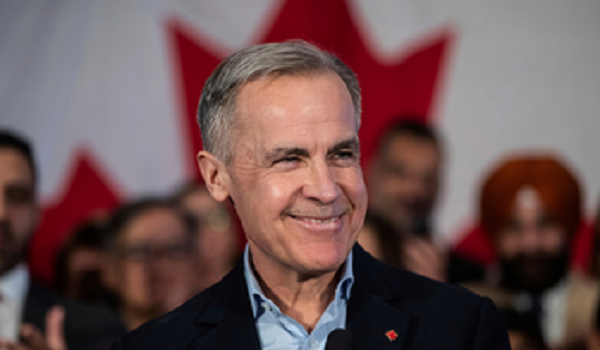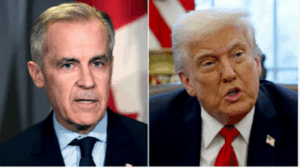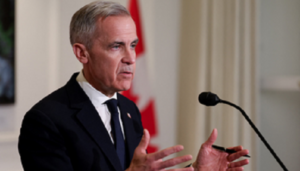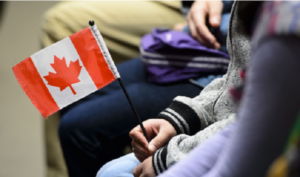Poll finds most Canadians tap Carney as best candidate to negotiate with Trump
More than three in five Canadians see Liberal Leader Mark Carney as the best person to negotiate with U.S. President Donald Trump, a new public opinion poll suggests.
The survey, commissioned by The Globe and Mail and La Presse and conducted by Nanos Research, says 62 per cent of respondents think Mr. Carney would do the best job in talks with Mr. Trump, with only 24 per cent choosing Conservative Leader Pierre Poilievre.
Well behind were NDP Leader Jagmeet Singh, Bloc Québécois Leader Yves-François Blanchet and People’s Party of Canada Leader Maxime Bernier at about 1 per cent each.
Before being presented with a randomized list of answers, respondents were asked: “Which one of the following politicians would do the best job at negotiating with U.S. President Donald Trump?”
In Quebec, where the poll included a larger-than-usual sample to allow for more precise results, 66 per cent of respondents labelled Mr. Carney as the best choice to deal with Mr. Trump, higher than the national number of 62 per cent. Mr. Poilievre was at just 12 per cent in the province.
(The Quebec results, based on a sample of 402 respondents in the province, are considered accurate within plus-or-minus five percentage points, 19 times out of 20.)
The survey also suggests Mr. Carney’s edge is compounded by a sharp rise in the number who name Mr. Trump’s chaotic reign as the top issue in the campaign leading up to Canada’s federal election on April 28.
The numbers show 47 per cent of respondents across Canada declaring that dealing with the U.S. President is the most important election issue, up from 36 per cent a month earlier. The economy was ranked most important by 25 per cent, with other issues trailing well behind, such as taxes (5 per cent), immigration (4 per cent) and health care (3 per cent).
Respondents were asked: “What is the most important issue that will influence how you vote in the upcoming federal election?”
The survey, conducted from March 29 to April 3, overlapped with April 2, the day Mr. Trump labelled “liberation day” and announced double-digit tariffs on countries around the world while implementing threatened duties on the auto sector, hammering Canada’s industry. These were added to Mr. Trump’s economically damaging pre-existing duties on steel, aluminum and Canadian goods that are not compliant with the U.S.-Mexico-Canada Agreement on trade.
U.S. trade penalties.
Pollster Nik Nanos says the survey results show Mr. Carney firmly in the driver’s seat in the campaign as long as the U.S. President remains the top issue, noting that the Liberal Leader enjoys an advantage since, as the Prime Minister, he is already directly involved in relations with the U.S.
“He gets a tip of the hat from twice as many Canadians as Pierre Poilievre when it comes to negotiating with President Donald Trump,” Mr. Nanos said in an interview.
“What this speaks to is that, for the Liberals in the polls right now, if the focus is on Trump and negotiations, that will be to their advantage,” Mr. Nanos said. “If the focus is on jobs, the cost of living, issues like that, then the playing field levels.”
While the numbers also show Mr. Carney well ahead of Mr. Poilievre in Quebec on dealing with Mr. Trump, Mr. Nanos warns that this could shift. The coming French-language debate will be key for the Liberal Leader, he said. Critics have noted he has difficulty speaking extemporaneously in French.
“If Quebec unravels for Carney and the Liberals, then they’re done,” Mr. Nanos said.
The survey also found that 57 per cent of respondents across Canada say they feel more patriotic than they did a year ago. Among Quebeckers, the number was 52.9 per cent. Respondents were asked: “Do you feel more patriotic, less patriotic or as patriotic about Canada compared to a year ago?”
The numbers also show large majorities of respondents saying they have taken anti-U.S. actions in their own lives: 74 per cent said they have “avoided purchasing American food products where possible,” and 70 per cent had “avoided buying other American goods in stores/online where possible.” Twenty-eight per cent said they had cancelled a planned trip to the U.S.
The question on the survey was: “Since the diplomatic tensions with the U.S. started about a month ago, which of the following actions have you done, if any?” followed by a randomized list of actions.
The survey results also showed 66 per cent of respondents expressing concern about a possible recession within the next 12 months.
Just over half, 51 per cent, were concerned about Mr. Trump’s threat to make Canada the 51st state of the United States. But 30 per cent said they were not concerned.
Respondents were asked: “On a scale from 0 to 10 where 0 is not at all concerned and 10 is extremely concerned, how concerned are you about the following,” and offered the prompts “President Trump threatening to make Canada the 51st state of the United States” and “a possible recession in the next 12 months.”
The survey of 1,223 Canadians is considered accurate within 2.8 percentage points, 19 times out of 20. The full methodology for all surveys can be found at: tgam.ca/polls.
This article was first reported by The Globe and Mail














